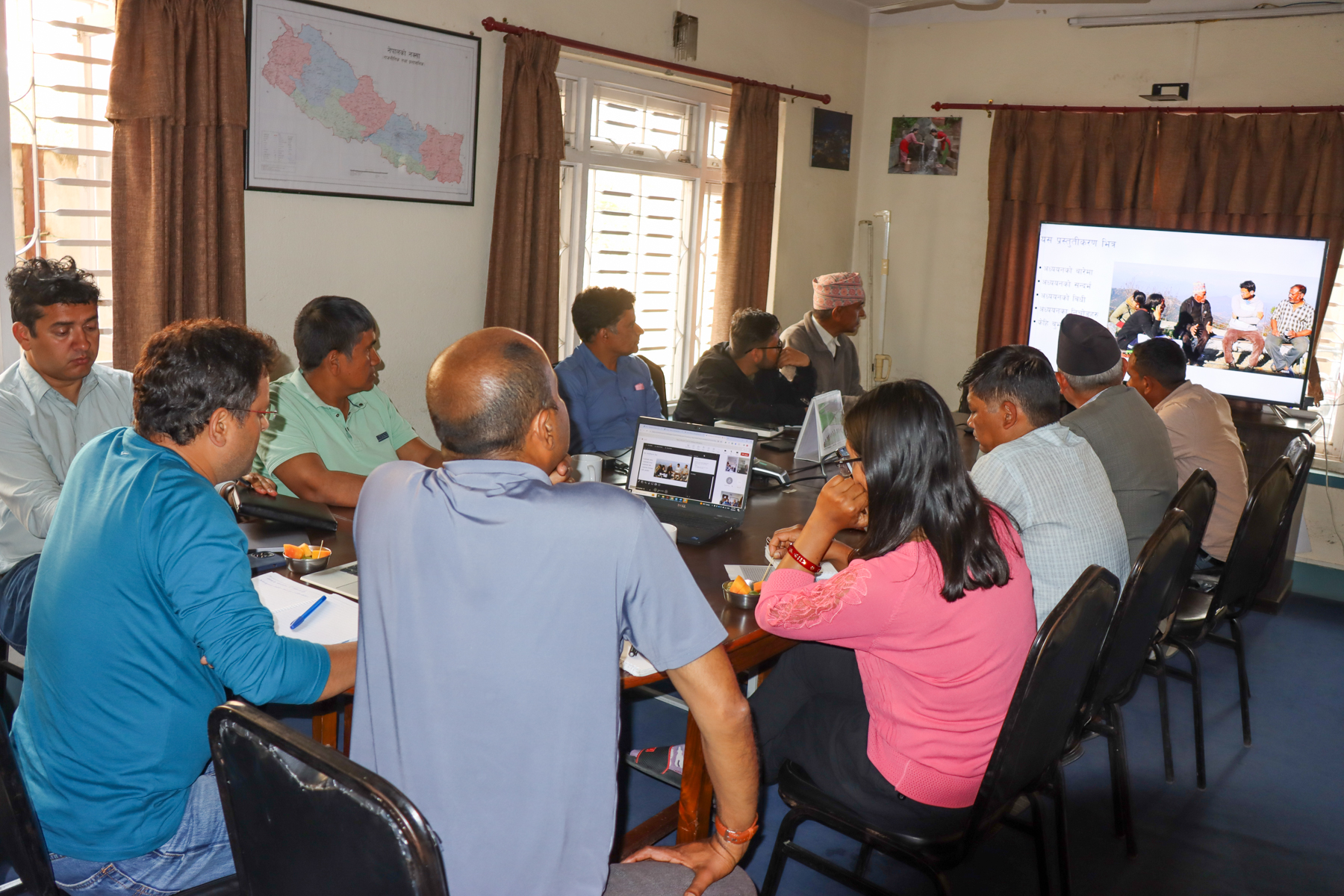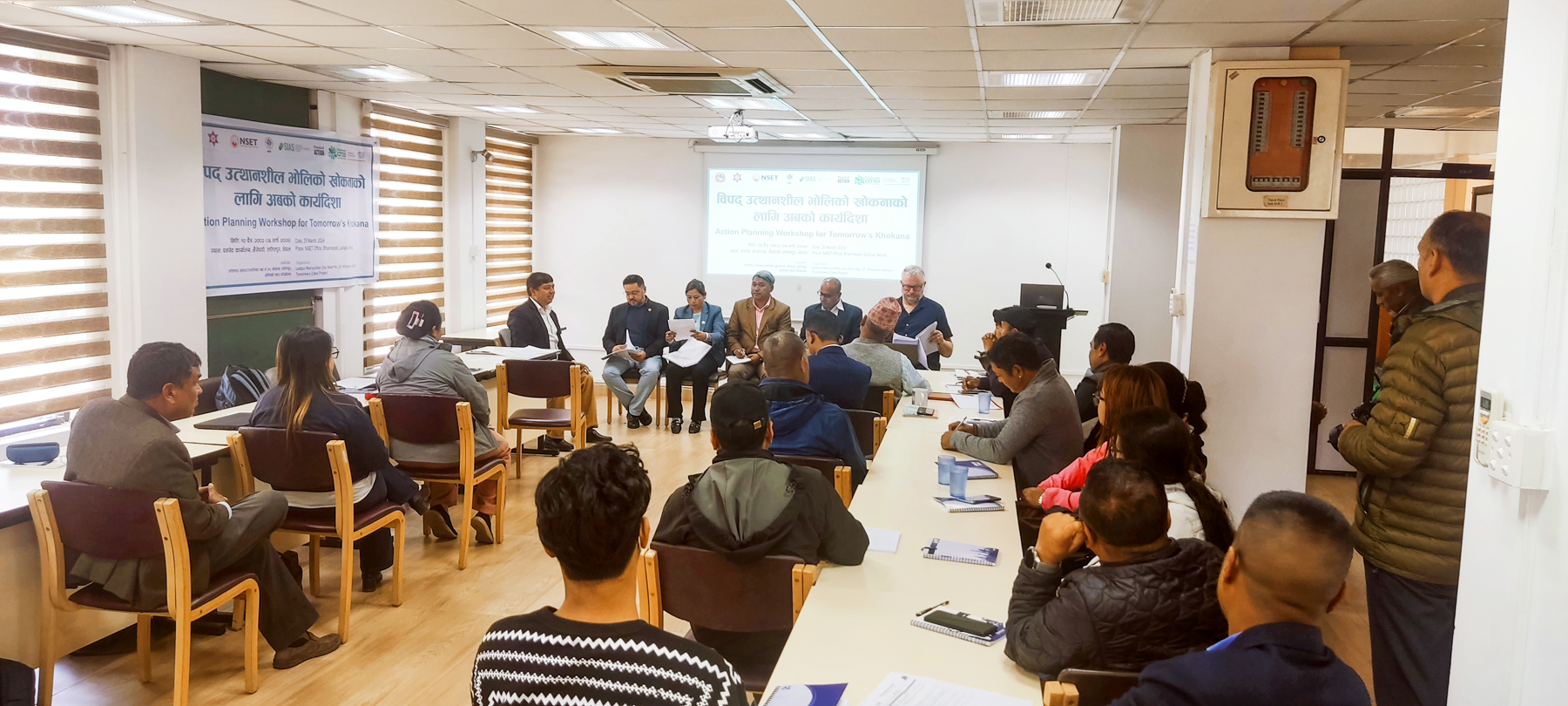On March 20, 2022, Southasia Institute of Advanced Studies (SIAS) conducted a local-level inception workshop in Ramechhap. The workshop was organized as part of the “Co-producing a shock-resilient business ecosystem for women-led enterprises in Nepal” project funded by the International Development Research Centre (IDRC) and led by SIAS in collaboration with Aria Solutions, NIMS College, Himalayan Bio-Trade Pvt. Ltd. (HBTL). It is an action-research project that envisions the identification of gender-based constraints in agriculture and forest-based enterprises, especially in the context of vulnerabilities such as the pandemic and climate risks. It consequently aims to take actions to create an enabling environment for women farmers and entrepreneurs to attain financial self-reliance guided by climate-friendly practices. Ramechhap is one of the three study sites of the project where the action-research project will focus on legume-producing women’s cooperatives and groups.
The local level inception workshop in Ramechhap intended to familiarize the potential project stakeholders with the project, its approach in their area and its expected outcomes. 22 representatives from the local government and cooperatives groups attended the workshop. Ms. Srijana Khadka, Deputy Mayor, Ramechhap Municipality was also present. The workshop lasted for a total of two hours (9-11 AM) and followed a participatory approach. A discussion session and presentation from the participants’ group followed presentations from project team members.
Mr. Indra Bahadur Rana Magar from Sagarmatha Pashupalan tatha Krishi Sahakari Sanstha delivered his welcome remarks and appreciated the efforts of the project to recognize and enhance Ramechhap’s status as a pocket area for legume production. An introduction session of all the participants followed after his brief speech.
Mr. Sushant Acharya, CREW team member began the presentation sessions. He provided an overview of the project’s context and highlighted its objective to create a resilient ‘ecosystem of support’ for women-led enterprises in Ramechhap. He reiterated Ramechhap’s strength in legume production and how the project envisions leveraging that status quo especially in relation to women farmers and enterprises to create and ensure their economic self-sufficiency.
Mr. Buddhi Raj Tamang from Aria Solutions continued next by presenting the specific interventions Aria Solutions will do in Ramechhap in line with the project’s objectives. Although legumes are a speciality of Ramechhap, they have not received sufficient recognition and have the potential to reap more benefits for the community, especially for women farmers. Aria Solutions has the responsibility of visibly positioning legumes produced in Ramechhap in the national and international market through branding and digitization. Besides that, Mr. Tamang also highlighted they will work closely with the local cooperative and strengthen their governance through relevant policy formulation. They will also develop software tailored for legume producing farmers and the cooperative that tracks the overall production to balance the demand and supply of legumes in the future.
A discussion round with the participants followed the presentation session. The participants were divided into three groups representing local representatives, legume-producing cooperatives and local farmers’ cooperatives/ producer group. Each group based their discussion on two questions- gender-based constraints for legume-producing farmers and possible solutions to overcome them- and presented a summary of their discussions.
The first group comprising cooperative and legumes producing group (producer group) stated barriers such as lack of education, multiple work burdens for women and limited access of women’s role in market price fixation of agricultural produce. The second group of local elected representatives echoed the previous group and added further points such as lack of trust placed in women in regards to financial transactions, limited women’s participation in political affairs and existent social, cultural, economic and physical discrimination. The third group representing institutions and organizations presented barriers such as the need for women to take consent before selling legumes, lack of financial agency among women, negligence in the management of required manure and seeds for legumes production and higher involvement of women in lower nodes of the legume value chain such as in production. Some of the common solutions proposed by all three groups included the need for men to engage in household chores to lessen the multiple work burdens of women, capacitating women to increase their engagement in higher nodes of the value chain of legumes production and providing leadership roles to women and creating opportunities that help them have better linkage to the market.
After the group work, the Ward Chairperson of Ward No.5, Mr. Bhim Bahadur Tamang presented his remarks. He emphasized the relevance of the project in Ramechhap and agreed that it would be instrumental in further enhancing the area’s status as a pocket area for legumes production. Women are at the forefront of the value chain of legumes- from producing to selling- and he hoped that the project’s interventions would help make production more efficient and facilitate a fair price mechanism. Further, he appreciated the digitization component of the project and reiterated it as the need of the hour, especially considering the burgeoning digital utilities. The Chairperson concluded that rather than considering the financial support that the project provides, we must emphasize how it will help Ramechhap gain recognition in the longer run. He was hopeful that the project would be highly valuable for the district’s well-being in the future.
Ms. Srijana Khadka, Deputy Mayor, Ramechhap Municipality, expressed her gratitude for initiating the project in Ramechhap, given its status as a pocket area for legumes production. She stated that the value of legumes has been increasing day by day and it is a good opportunity to elevate Ramechhap’s legume production. She also assured of the local government’s support to help the project move forward in a systematic way.
The workshop ended with a concluding remark from the Chairperson of the event, Mr. Prithvi Shrestha from Sagarmatha Pashupalan tatha Krishi Sahakari Sanstha. He shared that the project would integrate lead women farmers and help them develop their leadership skills along with other benefits. He further added that the project brought both opportunities and challenges and collaboration from relevant stakeholders was imperative for its successful completion.




